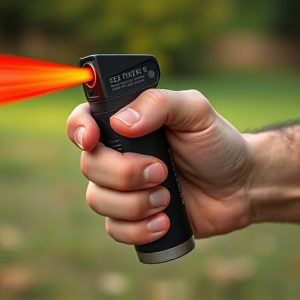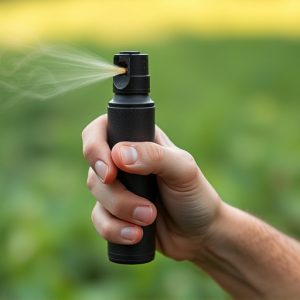Civilian Pepper Spray: Legalities, Composition, and Safe Handling
Pepper spray, a non-lethal self-defense tool, is governed by varying state laws in the US. These law…….
Pepper spray, a non-lethal self-defense tool, is governed by varying state laws in the US. These laws dictate purchase, carrying, and usage restrictions, with some states having strict controls like doctor prescriptions, while others permit open carry. Understanding these local regulations is vital for legal possession and responsible use of civilian-grade pepper spray, ensuring compliance, safety, and effective deployment while minimizing collateral damage.
“Uncover the power and complexities of civilian-grade pepper defense spray, a tool gaining popularity for personal safety. This comprehensive guide explores the intricate world of pepper spray, delving into its composition, effectiveness, and the legal landscape surrounding it. From federal guidelines to state-specific regulations, we navigate Pepper Spray Laws by State, ensuring you’re informed about your rights and responsibilities. Learn safe handling practices, understand its impact, and make an educated decision in our detailed analysis.”
- Understanding Pepper Spray: Composition and Effectiveness
- Pepper Spray Laws: Federal Guidelines vs. State Regulations
- State-Specific Pepper Spray Legalities: A Comprehensive Overview
- Safe Handling and Use Practices for Civilian Pepper Spray
Understanding Pepper Spray: Composition and Effectiveness
Pepper spray, also known as oleoresin capsicum (OC) spray, is a non-lethal self-defense tool designed to incapacitate an attacker temporarily. Its primary active ingredient is capsaicin, the chemical responsible for the heat sensation in chili peppers. This compound irritates the eyes and respiratory system, causing temporary blindness, coughing, and difficulty breathing. The composition of pepper spray varies by brand, but it typically includes a mixture of capsaicin, water, and other additives like UV stabilizers and preservatives.
When it comes to understanding pepper spray’s effectiveness, it’s crucial to consider the context and usage. Pepper spray is most effective in close-quarters encounters, as the target area needs to be directly exposed for the chemicals to take effect. However, its impact can be reduced by weather conditions, clothing, and even certain medical conditions. Additionally, the legal status of pepper spray varies across states in the US, with different regulations regarding age restrictions, permit requirements, and permissible uses. Familiarizing oneself with Pepper Spray Laws by State is essential for both responsible ownership and safety.
Pepper Spray Laws: Federal Guidelines vs. State Regulations
The laws surrounding pepper spray, or oleoresin capsicum (OC) spray, vary significantly from state to state in the US. While federal guidelines offer some basic regulations for its sale and possession, individual states hold the power to establish more stringent rules. These Pepper Spray Laws by State can dictate who can purchase and carry OC spray, where it can be used, and even the concentration levels allowed.
For instance, some states, like California, have strict controls, requiring a doctor’s prescription for high-strength pepper spray. In contrast, other states have more relaxed policies, enabling open carrying with minimal restrictions. Understanding these local regulations is crucial for citizens aiming to legally possess and use civilian-grade pepper defense spray.
State-Specific Pepper Spray Legalities: A Comprehensive Overview
In the United States, pepper spray laws vary significantly from one state to another. Understanding these regulations is crucial for individuals looking to purchase and carry civilian-grade pepper spray for self-defense purposes. Some states have stringent rules, allowing pepper spray only for law enforcement and military use, while others have more permissive policies, making it accessible to civilians for personal protection. As a result, “Pepper Spray Laws by State” have become a common search term among concerned citizens aiming to stay informed about their rights and responsibilities.
For instance, states like Texas and Florida have relatively relaxed regulations, permitting the open carry of pepper spray without a permit. In contrast, California and New York have more restrictive laws, often requiring permits or specialized training for civilian possession. These variations underscore the importance of due diligence when considering the legal implications of carrying pepper spray. Staying informed about local Pepper Spray Laws by State ensures compliance with regulations and empowers individuals to make informed decisions regarding their personal safety.
Safe Handling and Use Practices for Civilian Pepper Spray
When it comes to civilian-grade pepper defense spray, safe handling and proper use are paramount. Always familiarize yourself with local Pepper Spray Laws by State before purchasing or carrying any type of spray. Store your pepper spray in a secure, out-of-reach location, especially if there are children or pets in the household. Keep the safety clip attached until you’re ready to deploy, ensuring accidental activation is avoided.
Before using the spray, assess the threat level and ensure it’s the best line of defense. Maintain a safe distance from the assailant, typically 2-3 meters, and aim for the face and eyes to maximize effectiveness while minimizing collateral damage. After use, wash your hands thoroughly and dispose of the spray according to local regulations. Regularly inspect and maintain your pepper spray device to ensure its functionality and longevity.
Understanding the legal landscape surrounding pepper spray is essential for responsible civilian ownership. By knowing the varying Pepper Spray Laws by State, users can ensure they remain compliant and employ this self-defense tool effectively. Safe handling practices, combined with a clear understanding of local regulations, empower individuals to protect themselves while adhering to legal boundaries.


